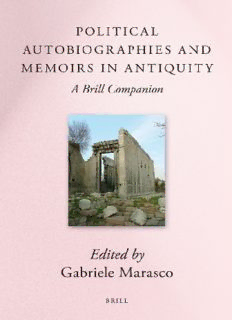
Political Autobiographies and Memoirs in Antiquity (Brill's Companions in Classical Studies) PDF
Preview Political Autobiographies and Memoirs in Antiquity (Brill's Companions in Classical Studies)
Political Autobiographies and Memoirs in Antiquity Political Autobiographies and Memoirs in Antiquity A Brill Companion Editedby Gabriele Marasco LEIDEN•BOSTON 2011 Coverillustration:WalloftheTempleofAugustusandRomainAnkaradepictingtheRes GestaeDiviAugusti. Thisbookisprintedonacid-freepaper. LibraryofCongressCataloging-in-PublicationData Politicalautobiographiesandmemoirsinantiquity:aBrillcompanion/editedbyGabriele Marasco. p.cm.–(Brill'scompanionsinclassicalstudies,ISSN1872-3357)Includes bibliographicalreferencesandindex. ISBN978-90-04-18299-8(hardcover:alk.paper) 1.Classicalbiography–Historyandcriticism.2.Biographyasaliteraryform.3.Memoirs.I. Marasco,Gabriele.II.Title.III.Series. PA3043.P652011 880.9'35–dc23 2011028606 ISSN1872-3357 ISBN9789004182998 Copyright2011byKoninklijkeBrillNV,Leiden,TheNetherlands. KoninklijkeBrillNVincorporatestheimprintsBrill,GlobalOriental,HoteiPublishing, IDCPublishers,MartinusNijhoffPublishersandVSP. Allrightsreserved.Nopartofthispublicationmaybereproduced,translated,storedin aretrievalsystem,ortransmittedinanyformorbyanymeans,electronic,mechanical, photocopying,recordingorotherwise,withoutpriorwrittenpermissionfromthepublisher. AuthorizationtophotocopyitemsforinternalorpersonaluseisgrantedbyKoninklijkeBrillNV providedthattheappropriatefeesarepaiddirectlytoTheCopyrightClearanceCenter, 222RosewoodDrive,Suite910,Danvers,MA01923,USA. Feesaresubjecttochange. CONTENTS Preface ................................................................. vii GabrieleMarasco Abbreviations .......................................................... xi . ClassicalGreece.................................................... 1 VivienJ.Gray . RoyalAutobiographyintheHellenisticAge ...................... 37 CinziaBearzot . TheHellenisticAge:AutobiographyandPoliticalStruggles...... 87 GabrieleMarasco . RepublicanRome:AutobiographyandPoliticalStruggles ....... 121 JoséM.Candau . TheLateRepublic:AutobiographiesandMemoirsintheAgeof theCivilWars ...................................................... 161 JeffreyTatum . CaesarandtheCorpusCaesarianum.............................. 189 MarcMayer . TheAugustanAge.................................................. 233 JosephGeiger . Augustus:TheEmperorWritesHisOwnAccount................ 267 RonaldThomasRidley . TheEarlyEmpire................................................... 315 PereVillalbaVarneda .TheSecondandThirdCentury.................................... 363 RichardWestallandFrederickBrenk .TheLateEmpire.................................................... 417 HartmutLeppin IndexofAncientNames............................................... 455 PREFACE This book aims at clarifying what it meant in antiquity to write about oneself,analyzingboththeautobiographiesandthememoirs,inwhich, however,theauthorgrantedapredominantspacetohisownactions.It will be mostlysomethingnew,given thattheonly generalstudy onthe autobiography—notstillreplaced—ofGeorgMisch,bothintheGerman edition1andintheEnglishrevisedandimprovedversion2isaworkfrom anon-classicistandisclearlyaddressedinadifferentway.Ithighlightsthe philosophical autobiography, which was the center of the interests and competencesofitsauthor;3itlimits,therefore,thestudyofthepolitical autobiographyanditalsoneglectssomeessentialworks(e.g.,theautobi- ographyofLibanius isnotevenmentioned).Somerecentconferences,4 although showing a renewed interest in the autobiography, have been veryfragmentaryandfarfromprovidingasystematictreatment,which wouldhighlightthedevelopmentofthisliterature,theexistingrelation- shipsamong thevarious works,and theinfluence ofthetraditions and ofnarrativeorientations. Ontheotherhand,thepoliticalautobiographiesandmemoirsbelong toacompletelydifferentcategory:theyaremorelinkedtotheimmediate events,tothepassionsandthestrugglesthattheautobiographicwritings of the philosophers, of the literates, and of the men of the Church as Augustine. The personalinterests, the partisanships, sometimesalso the immediate practical aims justify therefore a greater prudence in verifying their reliability. The approach of the autobiographies to the memoirsdevotedtoparticularevents(excludedintheworkofMisch)is 1 GeschichtederAutobiographie,,DasAltertum(FrankfurtamMain,,2). 2 AHistoryofAutobiographyinAntiquity,vols.(London,). 3 Onthepersonality,theworkandthephilosophyofMisch,discipleandson-in-law ofWilhelmDilthey,cf.O.F.Bollnow,StudienzurHermeneutik.BandII:Zurhermeneuti- schenLogikvonGeorgMischundHansLipps(Freiburg/Munich,);M.Mezzancanica, GeorgMisch.Dallafilosofiadellavitaallalogicaermeneutica(Milan,). 4 M.-F.Baslez,P.Hoffmann,andL.Pernot,éds.,L’inventiondel’autobiographied’Hé- siodeàSaintAugustin:actesdudeuxièmecolloquedel’Equipederecherchesurl’hellénisme post-classique(Paris,EcoleNormaleSupérieure,–juin)(Paris,);M.Reichel, ed., Antike Autobiographien. Werke—Epochen—Gattungen (Europäische Geschichts- darstellungen)(Cologne,).Seealso,onamorelimitedcontextoftime,M.Erler, S.Schorn,eds.,DiegriechischeBiographieinhellenistischerZeit(Berlin). viii preface suggested, moreover, from an apparently self-evident affirmation of ArnaldoMomigliano,5whoobservedthatnoautobiographycanbecon- sidered really complete—first ofall because it cannot narrate thedeath ofhismaincharacter.Excluding,therefore,someworksthatareinacer- tainmeasureautobiographic,butthathoweverbelongtootheraffirmed and approved literary genres, such as oratory and poetry (for instance, thepoliticalsongsofAlcaeus),theautobiographiesandthememoirsare substantiallysimilarandworthybeingtreatedtogether. On the other hand, the available material is needed for a complex job of selection and coordination. The lives of Xenophon,Cicero, Cae- sar, Augustus, and some Roman emperors are well known and there is no need to repeat them; other characters, such as Demetrius of the Phalerum,AratusandtosomeextentevenJosephusarelessfamous,but howeverknownbytheclassicists.Forothers,lessknowntothegeneral public,itwasnecessarytoaddabriefinformation,withtheessentialbib- liography. Thefundamentalthemeswehavedealtwithinthisbookarethree: . First of all, the birth and the development of the autobiography, an extremelycomplexproblembecause oftheshortageofthetestimonies, but alsobecause ofthedifficulty todistinguishtheoriginsofanotwell encoded literary genre in an age in which the historical narration, the geographical,andtheethnographicwerelikelytoconfuse,aswecansee particularlyintheworkofHerodotus.Iremind,particularly,ofthecases ofSkylaxandofIonofChius,butstillinXenophon’sAnabasisand,aswe shallsee,inNearchus’workthesethreeaspectsoftenhavethetendency tooverlap. .Theproblemofthefinalitiesand,consequently,ofthereliabilityofthe examinedworks.Someautobiographiesandmemoirshavebeenwritten withobviousapologeticfinalities,withtheaimtodefendthereputation of a politician at the end of his career or close to retirement, in the eyes of the contemporaries and of posterity. Some cases are classical, as Xenophon, who writes his work in his retreat; Aratus of Sikyon, who hopelesslytries to justify his rounds waltz with Macedon and the substantial failure of its political action; Quintus Dellius, desultor belli civilis, the official of Marc Anthony passed to Octavian, engaged to 5 Momigliano,Biography,. preface ix defendtheindefensible;stillFlaviusJosephus,withalltheconsequences thathispositionasarebelJewpassedtotheallegiancetoRomeinvolved onthepolitical and, let’snotforgetit, onthereligiousfield. Inall these cases,theanalysisofthemethodsbywhichtheauthorpursues,moreor lessslightly,itspropagandistaimrevealsagreatdealofcomplexpolitical situations and of the way according to which a literary genre could be foldeduptopartisanfinalities. Other works had propagandist aims instead, relating to the politi- calstruggleoftheirtimes.Theywerethereforemoretied to immediate motives and, for us,moresubject to doubts and suspicionswith regard totheirreliability;but,perhapsjustforthis,theyaimedtopresentthem- selveswithgreaterinsistenceastruthfulandobjective.Caesar’sCommen- tariesareobviouslytheclassicalcase;butstillmoreinteresting,becauseof theiroutspokenlypubliccharacter,aretheeulogisticregistrations,from thoseoftheHellenistickingstotheResGestaeofAugustus. Finally,otherworkswerewrittentosupplymaterialforthehistorians, withdifferentoutcomes.ThememoirwrittenbyCiceroonhisconsulate andsenttothehistorianPoseidoniustobeusedbyhimafterappropriate amendmentswasrejected—wedonotknowwithhowmuchpoliteness— and this clearly shows its degree of reliability (which, after all, had to correspondto the innate modesty of Cicero). What Eunapius required by thephysician Oribasiuson thecampaign in Persia andonthedeath of Julian was added to his historical work and it would be interesting to beable to judge hismethodandresults.Thissystemislikely tohave beenusedinanumberofsituations(e.g.,theletterinwhichPliniusthe Younger,onTacitus’request,narratedthedeathofhisuncleduring the eruptionofVesuvius).6Also,inthesecases,toclarifytheaimsofawork alsomeanstoclarifyitscharacteristics. . The development and the evolution of this genre in the times. In this perspective, it is important to clarify its characteristics and the lit- erary influences on it. For example, it seems very interesting to me to outline theevolution ofthe autobiographic inscriptions, fromtheearly Hellenistic ones to Antiochus of Commagene, until the Res Gestae of Augustus. In this case, the autobiographical tradition got together, and perhaps surrendered to other models, those of the great royal inscrip- tions,widespreadintheOrientalworld,fromtheEgyptianpharaohsto 6 Plin.,Epist...
Description: